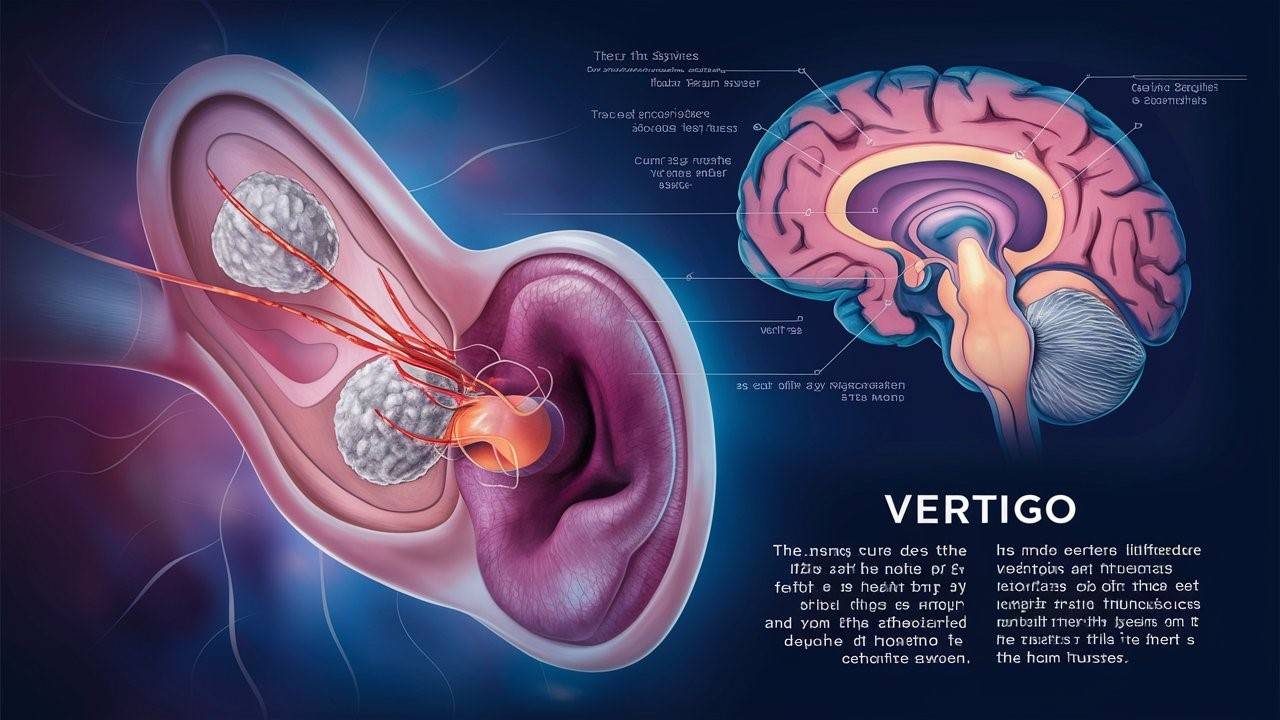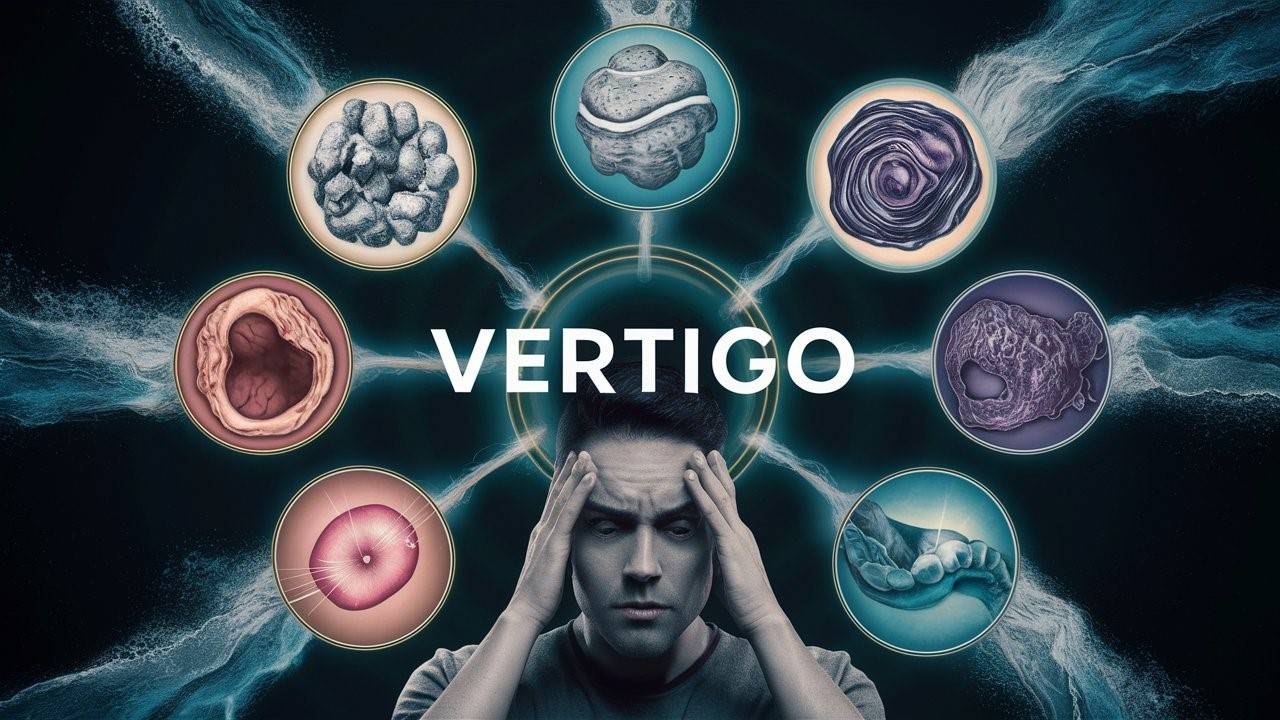Causes of Vertigo: From Ear Crystals to Brain Tumors – What to Know
Discover the surprising causes of vertigo, from ear crystals to brain tumours. Learn symptoms, treatments, and when to seek help. Your guide to understanding dizziness.
Quick Guide
Causes of vertigo range from minor to serious:
- Inner ear problems (most common)
- Migraine headaches
- Head or neck injuries
- Certain medications
- Neurological issues (rare)
Key points:
- Symptoms include dizziness, nausea, and balance problems
- See a doctor if vertigo is severe, persistent, or accompanied by other symptoms
- Treatment depends on the underlying cause
Understanding Vertigo: More Than Just Dizziness

Vertigo isn’t just feeling dizzy. It’s a specific sensation that the world is spinning around you or that you’re spinning when you’re still. As someone who has experienced vertigo firsthand, I can tell you it’s an unsettling and sometimes frightening experience.
The causes of vertigo are diverse, ranging from common and benign conditions to more serious medical issues. Understanding these causes is crucial for proper diagnosis and treatment.
Common Causes of Vertigo

- Benign Paroxysmal Positional Vertigo (BPPV)
BPPV is one of the most common causes of vertigo. It occurs when tiny calcium crystals in your inner ear become dislodged and move into the semicircular canals.
[IMAGE HERE: Add a close-up photo of your ear, with an arrow pointing to where the inner ear would be]
Symptoms:
- Brief episodes of vertigo triggered by head movements
- The feeling of spinning or swaying
- Nausea
- Loss of balance
I remember when I first experienced BPPV. I woke up one morning, turned my head, and suddenly the room was spinning. It lasted only a few seconds, but it was intense and recurred every time I moved my head in a certain way.
Treatment often involves specific head maneuvers to reposition the crystals. I underwent the Epley maneuver, and it was surprisingly effective in resolving my symptoms.
- Vestibular Neuritis or Labyrinthitis
These conditions involve inflammation of the inner ear or the vestibular nerve, often because of viral infections.
Symptoms:
- Sudden, severe vertigo that may last for days
- Nausea and vomiting
- Difficulty with balance
- Potential hearing loss (in labyrinthine)
Treatment typically includes:
- Vestibular suppressant medications
- Antiviral drugs (if a virus is suspected)
- Vestibular rehabilitation exercises
- Meniere’s Disease
Meniere’s disease is a chronic condition affecting the inner ear. It’s one of the more complex causes of vertigo.
Symptoms:
- Recurring episodes of vertigo
- Fluctuating hearing loss
- Tinnitus (ringing in the ears)
- The feeling of fullness in the affected ear
Treatment may include:
- Dietary changes (low-salt diet)
- Diuretics
- Vestibular rehabilitation
- In severe cases, surgical interventions
- Vestibular Migraine
Migraines aren’t just headaches. They can also be a significant cause of vertigo, even without the typical migraine pain.
Symptoms:
- Vertigo episodes last minutes to hours
- Sensitivity to light and sound
- Visual disturbances
- Nausea
As someone who suffers from vestibular migraines, I can attest to how debilitating they can be. My world can start spinning without warning, often accompanied by visual auras and intense nausea.
Treatment options:
- Migraine preventive medications
- Lifestyle changes (sleep hygiene, stress management)
- Trigger avoidance
Less Common Cause of Vertigo
- Acoustic Neuroma
An acoustic neuroma is a benign tumour growing on the vestibular nerve. While rare, it’s one of the more serious causes of vertigo.
Symptoms:
- Gradual onset of vertigo
- Progressive hearing loss in one ear
- Tinnitus
- Balance problems
Treatment depends on the size and growth rate of the tumor and may include:
- Monitoring with regular MRI scans
- Radiation therapy
- Surgical removal
- Multiple Sclerosis (MS)
MS can cause vertigo when it affects areas of the brain involved in balance and spatial orientation.
Symptoms:
- Episodes of vertigo
- Other neurological symptoms (vision problems, numbness, weakness)
Treatment focuses on managing MS symptoms and may include:
- Disease-modifying therapies
- Vestibular rehabilitation
- Medications for symptom relief
- Stroke or TIA
While less common, stroke, or transient ischemic attack (TIA) can cause sudden, severe vertigo.
Symptoms:
- Sudden, severe vertigo
- Other neurological symptoms (facial drooping, arm weakness, speech difficulties)
This is a medical emergency requiring immediate attention.
When to Seek Medical Help
Not all causes of vertigo are benign. It’s crucial to know when to seek medical attention.
Red flags include:
- Sudden, severe vertigo
- Vertigo accompanied by neurological symptoms
- Persistent vertigo that doesn’t improve
- Vertigo with hearing loss
I once experienced a particularly severe bout of vertigo that didn’t subside after a few days. Despite my initial reluctance, I decided to see my doctor. It turned out to be vestibular neuritis, and early treatment significantly shortened my recovery time.
Diagnosing the Causes of Vertigo
Determining the specific cause of vertigo often involves a series of tests:
- Physical examination
- Neurological examination
- Hearing tests
- Balance tests
- Imaging studies (CT or MRI)
During my diagnostic process, I underwent several of these tests. While they can be time-consuming, they’re crucial for accurate diagnosis and appropriate treatment.
Treatment Options for Various Causes of Vertigo
Treatment varies widely, depending on the underlying cause:
- Repositioning maneuvers (for BPPV)
- Medications (antihistamines, anti-nausea drugs)
- Vestibular rehabilitation therapy
- Lifestyle changes (diet, stress management)
- Surgery (in rare cases)
In my experience with different causes of vertigo, I’ve found that a combination of treatments often works best. For instance, when dealing with vestibular migraines, I use a mix of preventive medications, trigger avoidance, and stress-reduction techniques.
Living with Vertigo: Coping Strategies
Living with vertigo can be challenging, but there are ways to manage it:
- Create a safe home environment
- Practice good sleep hygiene
- Stay hydrated
- Avoid trigger foods
- Use assistive devices when necessary
I’ve found that keeping a vertigo diary helps identify triggers and patterns. It’s also been invaluable in discussions with my healthcare providers.
FAQs About Causes of Vertigo
Q: What triggers vertigo attacks?
A: Vertigo attacks can be triggered by various factors depending on the underlying cause. Common triggers include:
- Sudden head movements (especially for BPPV)
- Stress
- Certain foods or drinks (for vestibular migraines)
- Changes in air pressure
- Lack of sleep
- Dehydration
In my experience, identifying personal triggers through careful observation and journaling can significantly reduce the frequency of attacks.
Q: How do you get vertigo to go away?
A: The approach to resolving vertigo depends on its cause.
- For BPPV: Specific head maneuvers like the Epley maneuver can often provide quick relief
- For vestibular neuritis: Time and vestibular exercises usually help
- For Meniere’s disease: Dietary changes and medications may control symptoms
- For vestibular migraines: Trigger avoidance and preventive medications can help
Staying hydrated, getting adequate sleep, and managing stress can help reduce vertigo episodes.
Q: What is called the red flag in vertigo?
A: Red flags in vertigo are symptoms that may indicate a more serious underlying condition:
- Sudden, severe vertigo with neurological symptoms (facial drooping, arm weakness, speech difficulties)
- Vertigo with sudden hearing loss
- Vertigo that persists for more than a few hours without relief
- The first episode of severe vertigo in someone over 50
- Vertigo with severe headache or neck pain
These symptoms warrant immediate medical attention as they could indicate conditions like stroke, brain tumour, or other neurological issues.
Q: What are the 10 causes of vertigo?
A: While there are many potential causes of vertigo, here are 10 common ones:
- Benign Paroxysmal Positional Vertigo (BPPV)
- Vestibular neuritis or labyrinthine
- Meniere’s disease
- Vestibular migraine
- Acoustic neuroma
- Multiple sclerosis
- Stroke or TIA
- Perilymphatic fistula
- Cervicogenic dizziness (related to neck problems)
- Medication side effects
It’s important to note that this list isn’t exhaustive, and proper diagnosis by a healthcare professional is crucial.
Conclusion
Understanding the various causes of vertigo is the first step in managing this challenging condition. While vertigo can be distressing, remember that most causes are treatable. If you’re experiencing vertigo, don’t hesitate to seek medical advice. With proper diagnosis and treatment, you can regain your balance and quality of life.
Thank you for reading this comprehensive guide on the causes of vertigo. I hope you found it informative and helpful in your journey to understand and manage vertigo.
Recommended Reading
- 5 Tips for Instant Migraine Relief: Say Goodbye to Pain
- Migraine Piercing: The Ultimate Guide
- Calm the Storm: 19 Powerful Stress Reduction Techniques

Adel Galal is a health and wellness writer with over 30 years of experience studying and writing about health, fitness, nutrition, and healthy living. He is the founder of NextFitLife.com, where he shares practical, evidence-based guidance to support long-term health at any age. Adel’s mission is simple:
to help people make smarter health choices that fit real life, at any age.



